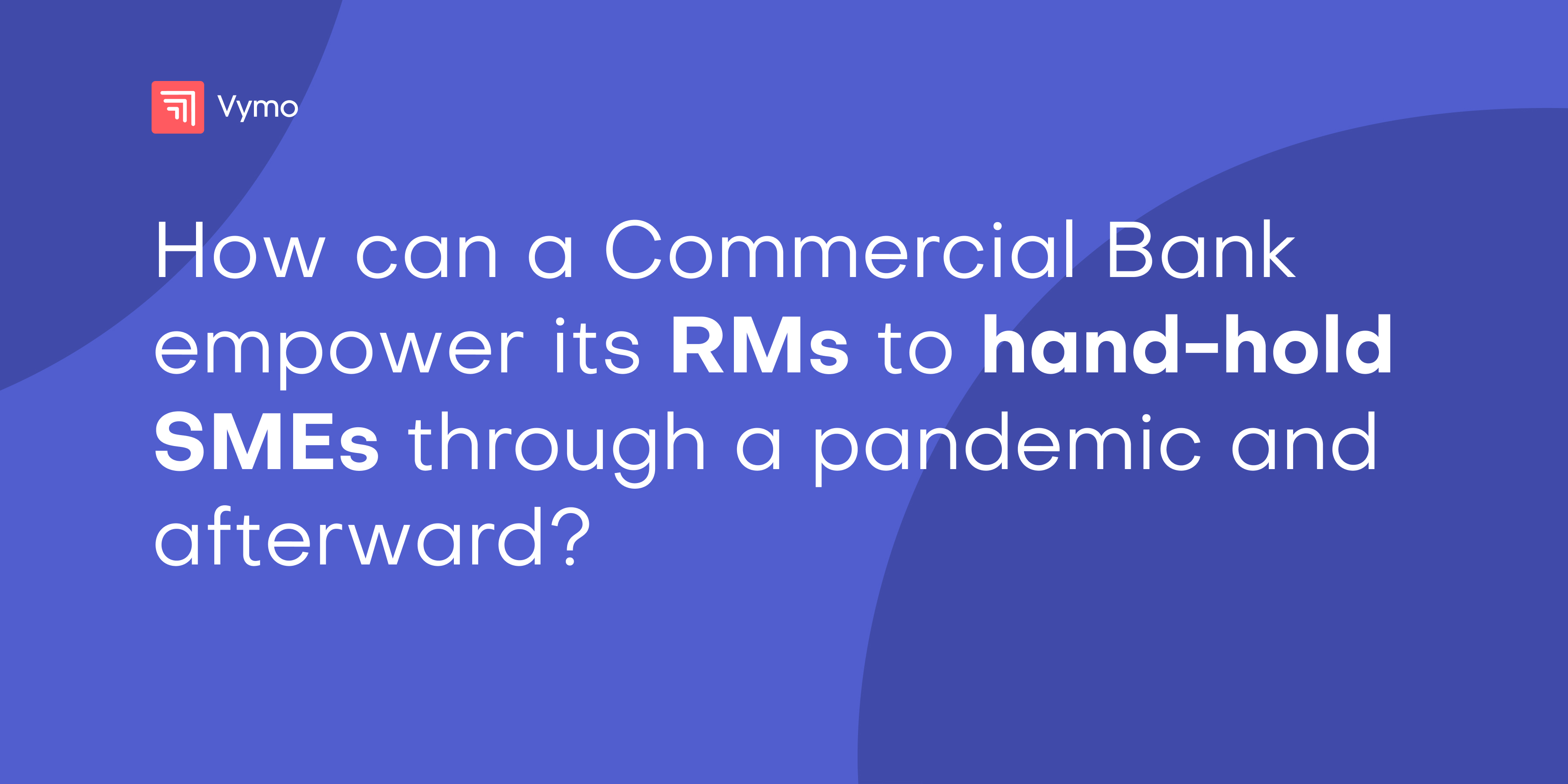
How can a Commercial Bank empower its RMs to hand-hold SMEs through a pandemic and afterward?
The pandemic has hustled once personal relationships to migrate onto digital platforms.
Long gone are the days, when business was face-to-face – a handshake, an agreement to meet over lunch on Fridays, or a game of golf might have sealed the deal 24 months back – but not today. How does a Bank stay relevant to its SME customers as personal goes digital?
Let’s then preview the evolving relationship of a Bank and SMEs through the peephole of the neo-normal era:
Small and Medium Enterprises (SMEs) operating in the U.S. currently number at 30 million. These collectively represent 99.9% of the total business establishments in the country.
What’s changed in the past year? Compared to January 2020, 34% of SMEs are closed. Numbers that reveal poignant ground realities.

Banking on the Mobile-First, Digital Relationship Manager
Here’s where Banks will have to empower their RMs to guide SMEs in their tryst with Digital Destiny.
The Digital RMs role would scale beyond reinforcing conventional wisdom – shift from FAB (Features, Advantages, Benefits) to ‘Insight Selling’ – while reconciling to the reality that SMEs are struggling to deal with the financial challenges created by the pandemic.
The conversation has shifted from traditional relationships to digital engagement with customers.
The Digitally-enabled, teleworking RM of the future will:
1.Be armed with data-driven insights
2. Built relevant and cohesive customer experience
3. Collaborate with team members across functions to align marketing goals with business objectives
4. Be equipped with metrics on customer satisfaction, acquisition, and lead generation
5. Leverage advanced segmentation to pinpoint customer wants
6. Utilize multiple digital touchpoints through a single-source platform
A well-planned Digital Transformation (DX) Policy will align the C-suite’s business goals with the RMs’ awareness and belief in the value of new tools and technologies. The 4 Ts of Digital Empowerment for Commercial RMs will involve the Tropes of – Target, Train, Test, and Translate.
Target
– Identify the teams that are most apt to use the digital tools.
– Evaluate their readiness to adapt to an environmental change.
– Emphasis on open communication between stakeholders, leaders, employees, and external partners.
– Understand the macro and micro DX goals, encourage participation, and establish roles and responsibilities.
Train
– Implement a ‘bottom-up’ training approach to create a strong foundation of next-gen leaders.
– Structure out governance plans for DX rollouts.
– Identify DX changemakers and reward positive DX adaptation and performance.
– Encourage a smooth feedback mechanism to collate opinions on DX efforts.
– Set up Subcommittees and encourage team huddles to initiate regular learning on technology updates, industry trends, and customer demands.
Test
– Monitor every sales-funnel step and customer touchpoint. Introspect and revamp (if needed) to keep on the right track.
– Divide DX initiatives into achievable, realistic smaller chucks to keep the teams motivated.
– Establish measurable KPIs to drive hands-on ownership.
Translate
Translation of DX initiatives is an ongoing process of measuring the impact of DX culture individually – on the employee, the partner, the customer, and collectively – the team, the stakeholders, the leaders, and the organization. KPIs will help answer such intangible questions as:
– Has TAT and employee decision-making improved?
– Is the business on target to achieve its desired (short and long-term) goals?
– Has the right message been consistently delivered to keep existing customers and acquire new customers?
– Are new talents being hired and where are they hired from?
– What are the major drivers in the market and is the sales team able to pinpoint and effectively act on these opportunities?
– Are the unique trigger points consistently identified to close every sale?
In such a scenario, a Sales Acceleration Platform is the ideal personal assistant to a Digital RM.
Vymo is a mobile-first, sales acceleration platform that collects rich contextual data of customer interactions automatically, learns from top performers, and then nudges the next best actions contextually to enable Relationship Managers to become trusted advisors of their SME customers.

A Sales Acceleration Platform is consistent.
It helps Banks to help their salespeople increase their sales outcomes and comes integrated with geofencing technology to allocate the right jobs to the right people based on proximity and priority. It identifies star performers and matches them to high-value accounts to dramatically improve lead conversion. Mundane day-to-day activities are automated to enable RMs to concentrate on more meaningful customer interactions. It calendarizes and schedules meetings and calls to enhance people productivity.

A Sales Acceleration Platform is resilient.
Business resiliency is essential for remote working to maintain customer delight. Well-integrated, easy-to-access Sales Enablement Platform empowers RMs to maintain high levels of customer engagement through a single source-point that navigates across scattered platforms – be it e-mails, social, videos, world wide web – to provide impactful, actionable data. Managers can intervene at the point of contact to guide and coach the RMs in real-time.
Interestingly, while the pandemic proved detrimental in the short run for SMEs and as they stagger back to normalcy; we should also credit it for precipitating Digital Transformation and hybrid working culture. It may very well be instrumental in a more connected and collaborative future experience. As Digital Technology evolves, video conferencing, messaging platforms, and intelligent chatbots will become the norm rather than the exception. The priorities and the challenges will shift to creating a cohesive customer journey and to create innovative ways to leverage varied digital platforms, improve Marketing ROI and attribution.
A conscious decision to be proactive – hiring new talents, upskilling or reskilling current employees, upgrading internal training processes will help Commercial Banks to be future-ready. Hence, in turn creating a digital-savvy, resilient team of Future Forward, NextGen Banking Leaders.

